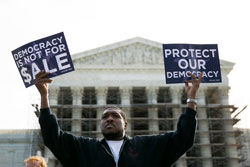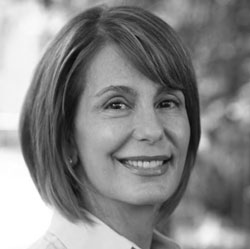McCutcheon vs. Federal Election Commission Case Debated
 On April 2 the Supreme Court came down with the most recent ruling on campaign finance. The outcome: an end to longstanding aggregate limits on campaign contributions. McCutcheon v. Federal Elections Commission brings the biggest change in free speech through campaign finance since the Citizens United decision in 2010. What exactly we regard as free speech has been subject to definitional expansion. First Amendment protection of ripping draft cards and protesting funerals of gay veterans has given us one of the most politically expressive societies in the modern world. The question at hand is, whether or not spending money in our political process is an act of political expression.
On April 2 the Supreme Court came down with the most recent ruling on campaign finance. The outcome: an end to longstanding aggregate limits on campaign contributions. McCutcheon v. Federal Elections Commission brings the biggest change in free speech through campaign finance since the Citizens United decision in 2010. What exactly we regard as free speech has been subject to definitional expansion. First Amendment protection of ripping draft cards and protesting funerals of gay veterans has given us one of the most politically expressive societies in the modern world. The question at hand is, whether or not spending money in our political process is an act of political expression.
Our Supreme Court justices voted 5-4 that indeed it is, in an opinion written by Chief Justice Roberts. The holding was that aggregate spending contributions do not meet the “rigorous” standards of review used to rule on corruption in prior cases on campaign finance. Simply put, five justices think that putting a cap on how much someone gives overall to PACs, political parties, and directly to candidates is unconstitutional.
Early on in the oral argument when the justices began to throw hypothetical scenarios at the appellant attorney, it became apparent that there were two issues that went into the decision. The first issue to be addressed was whether or not the current FEC laws were effective in stifling corruption within the political process. There were obvious misunderstandings as the attorney and the justices were not in agreement with certain aspects of campaign finance law. This is an issue all in itself about the political question.
Then the discussion moved to, if there is corruption, how do we know facts, and does limiting someone to id=”mce_marker”23,200 in overall spending on national campaigns effect this corruption? Justice Breyer pointed out we must look at the records. During the testimony for the BCRA (Bipartisan Campaign Reform Act) Congressmen and women said on record that there are “a handful of people” that they all know can spend hundreds of thousands of dollars. The Congress people claimed that these individuals do indeed have undue influence on elections. Justice Breyer gave this example. “The individual who, in fact, has wonderful ideas and convinces others, even by paying three cents to buy the internet [campaign funding website] or something, hasn’t a shot because it [won’t] influence people, not ideas, but the money.”
Another analogy would be to imagine an election for Ruler of Monmouth. The ruler would make decisions about Greek life, residential issues, campus events and dining options. In the democratic society we live in, of course, this position will be elected. The catch is candidates are accepting money for their campaigns. The more money the candidates raise, the more flyers, events, gifts and exposure they can take advantage of. Groups begin to rise on campus. One groups wants mac and cheese every day, another wants a senior only dorm with a bar on the bottom floor. Another group wants the library to be expanded. So they begin raising funds to support a candidate that might support their issue. But, when the Mac and Cheese group has a donor who can give $200,000 alone, what candidate could pass up the Mac and Cheese groups demands. They wine and dine every candidate at Jack’s Bar, paying for the most glorious signs and even a big ad on county wide television. The library expansion group only raised id=”mce_marker”00. Without restrictions their voice really doesn’t matter, even if they have a better idea.
This gets serious when its not about Mac and Cheese but about environmental laws, immigration reform etc.
From a freedom of speech perspective it comes down to the power behind each individual’s voice. Free speech should be about getting the most intelligent, useful and effective ideas into discussions. There must be a point where too much speech from one person negates the voices of others, not because they have better ideas, but because they can throw more money than everyone else.
This issue has consequences that we can already see. According to Huffington Post, big donors are already readying their wallets in lieu of the Supreme Court’s decision. Political parties are already promising increased availability of candidates to big spending donors. We are talking about 135 people who will be in the ears of our elected officials, one hand on the candidates back and the other writing a check.
What though will our future elections hold without these restrictions. Well, one parallel struck me as particularly and shockingly relevant. In high school, many of us read the Orwellian thriller “Animal Farm”, where the pigs took over the farm in Stalinist fashion. The mantra was, “That all animals on the farm were created equal, but some more equal than others.”


